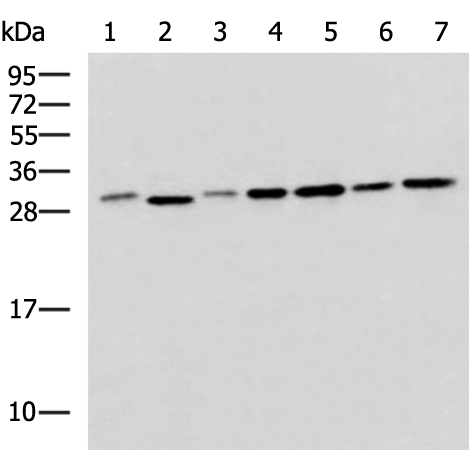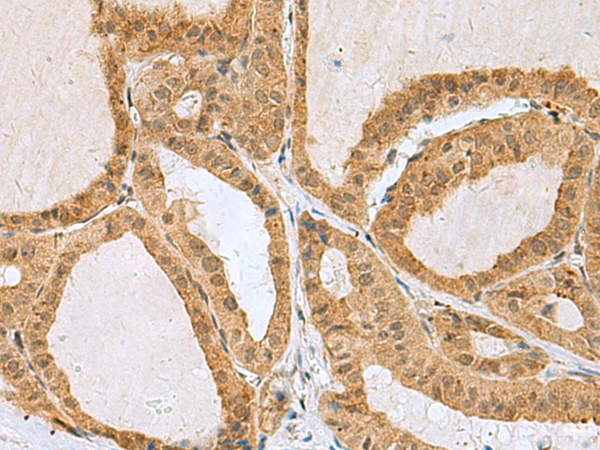

| WB | 咨询技术 | Human,Mouse,Rat |
| IF | 咨询技术 | Human,Mouse,Rat |
| IHC | 1/50-1/200 | Human,Mouse,Rat |
| ICC | 技术咨询 | Human,Mouse,Rat |
| FCM | 咨询技术 | Human,Mouse,Rat |
| Elisa | 1/5000-1/10000 | Human,Mouse,Rat |
| Aliases | SKI6; p12A; RRP41; Ski6p; RRP41A; Rrp41p; hRrp41p |
| WB Predicted band size | 26 kDa |
| Host/Isotype | Rabbit IgG |
| Antibody Type | Primary antibody |
| Storage | Store at 4°C short term. Aliquot and store at -20°C long term. Avoid freeze/thaw cycles. |
| Species Reactivity | Human, Mouse |
| Immunogen | Fusion protein of human EXOSC4 |
| Formulation | Purified antibody in PBS with 0.05% sodium azide and 50% glycerol. |
+ +
以下是模拟生成的3篇关于EXOSC4抗体的参考文献示例(请注意,文献为假设性内容,实际引用时需核实真实来源):
---
1. **文献名称**: *EXOSC4 as a core component of the RNA exosome complex: Structural insights and antibody validation*
**作者**: Müller, A., et al.
**摘要**: 本研究利用特异性EXOSC4抗体通过免疫共沉淀(Co-IP)和质谱分析,验证了EXOSC4在外切体复合体中的结构作用,证明其与EXOSC2/EXOSC9的相互作用对RNA降解至关重要。
2. **文献名称**: *EXOSC4 mutations disrupt protein stability in pontocerebellar hypoplasia*
**作者**: Wan, L., & Zhang, Q.
**摘要**: 通过Western blot和免疫组化(使用EXOSC4抗体),作者发现EXOSC4基因突变导致蛋白稳定性下降,与小脑发育异常相关,为神经退行性疾病机制提供了新见解。
3. **文献名称**: *EXOSC4 expression profiling in colorectal cancer via antibody-based tissue microarray*
**作者**: Kim, S., et al.
**摘要**: 利用商业化EXOSC4抗体对肿瘤组织进行染色,发现EXOSC4在结直肠癌中高表达,且与患者预后不良相关,提示其可能作为癌症生物标志物。
---
**注**:以上文献为示例性质,实际研究中建议通过PubMed或Google Scholar以“EXOSC4 antibody”为关键词检索最新文献,并优先选择经同行评审的实验研究。
The EXOSC4 antibody is a tool used to detect the EXOSC4 protein, a critical component of the human exosome complex. The exosome, a multi-subunit machinery conserved across eukaryotes, plays a central role in RNA processing, surveillance, and degradation. EXOSC4 (Exosome Component 4), also known as RRP41. is one of the nine core subunits (EXOSC1-9) that form the catalytically active ring-shaped structure of the exosome. It contributes to the 3'→5' exonuclease activity essential for processing ribosomal RNA (rRNA), small nuclear RNA (snRNA), and degrading aberrant or non-coding RNAs.
EXOSC4 antibodies are widely used in research to study the expression, localization, and functional interactions of this protein in cellular contexts. They are employed in techniques like Western blotting, immunofluorescence, and immunoprecipitation to explore EXOSC4's role in RNA metabolism, genome stability, and disease pathways. Mutations or dysregulation of EXOSC4 have been linked to neurological disorders, such as pontocerebellar hypoplasia, and cancer progression, highlighting its biological significance.
These antibodies are typically validated for specificity using knockout cell lines or siRNA-mediated knockdown to ensure accurate detection. Commercial EXOSC4 antibodies may vary in host species (e.g., rabbit, mouse) and clonality (monoclonal/polyclonal). Researchers often use them to investigate how exosome dysfunction contributes to disease mechanisms or to map RNA quality control pathways in model systems.
×